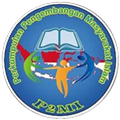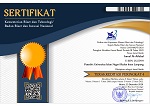STUDI TENTANG KEPUASAN PELANGGAN DALAM SISTEM MANAJEMEN PENDIDIKAN ISLAM DI SMK MA’ARIF NU 1 PURBOLINGGO LAMPUNG TIMUR
Abstract
This study is aimed to explain and predict factors influencing customer satisfaction in SMK Ma'arif NU 1 Purbolinggo East Lampung. Quality standards used as basic determiner of customer satisfaction are education national standard, those are: content standard, process standard, facilities standard, funding standard, and service standard. This study examines skill program quality, academic service quality, product and funding quality. Validity data in qualitative method was collected by interview, documentation, and observation. Then respondents of this study are researcher, headmaster, vice headmaster, teachers, parents, and students. Result of the study showed: First, the skill program is appropriate with content standard. Second, Academic service is appropriate with service standard so it has big contribution to the customer satisfaction. Analysis result of TERRA model Tangibelity, Empaty, Responsiveness, Reliability, and Assurance. Third, Product quality is supported by S1 qualified teachers, and sufficient facilities so it creates qualified academic product. It is also appropriate with process standard. Fourth Funding standard. The headmaster follows the valid rules in allocating funding standard those are arranging RAPBS, holding investigation, and holding the funding report by enclosing supported proof (receipt, and bill). Funding system impacts in creating education program, and improving academic service and product quality.
Keywords
Academic Service; Product; Customer Satisfaction
Full Text:
PDFReferences
Nasution, Nur, Manajemen Mutu Terpadu, Bogor: Ghalia Indonesia, 2015
Mulyasa, Manajemen Berbasis Sekolah, Bandung: PT Remaja Rosdakarya, 2004
Alma, Buchari, Manajemen Pemasaran dan Pemasaran jasa, Bandung: Alfabeta, 2005.
DOI: http://dx.doi.org/10.24042/ijpmi.v12i2.5986
Refbacks
- There are currently no refbacks.
Jurnal Ijtimaiyya is licensed under a Creative Commons Attribution-ShareAlike 4.0 International License.





1.png)
11.png)
.png)



